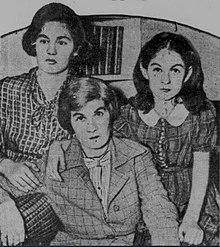Joseph Gelders
Joseph Gelders | |
|---|---|
 Gelders in 1936 | |
| Born | November 20, 1898 |
| Died | March 1, 1950 (aged 51) San Francisco, California, US |
| Alma mater | University of Alabama |
| Occupation(s) | Physicist, antiracist, civil rights activist, labor organizer, communist |
| Organizations | |
| Movement | |
| Children | |
| Relatives |
|
Joseph Sidney Gelders (November 20, 1898 – March 1, 1950) was an American physicist who later became an
Early life and education
Gelders was born November 20, 1898, in
Activism
While working at the University of Alabama, Gelders became more aware of oppressive
Kidnapping and assault

At 11:30 pm on September 23, 1936, Gelders was on his way home from an International Labor Defense (ILD) meeting when he was kidnapped on a Birmingham street and flogged with a leather strap. The abductors read and mocked Gelders's Scottsboro Boys–related documents, calling him a "dammed red" and "nigger lover."[7][11] After a national outcry, Alabama Governor Bibb Graves, who had connections with the Ku Klux Klan, ordered a state police investigation and authorized a $200 reward (equivalent to US$4,391 in 2023).[7] Police found four suspects, three of whom Gelders positively identified.[9] One was an employee of the Tennessee Coal, Iron and Railroad Company. Some accounts state that they were members of the Ku Klux Klan.[1] Despite an additional investigation by the La Follette Committee, no indictments were filed. In a private letter to the governor, the chief detective, G. C. Giles, remarked that the economic considerations would prevent convictions.[9]
Continued activism
In the spring of 1938, Gelders went to
Gelders and civil rights activist
Military career
On July 2, 1918, Gelders enlisted in the U.S. Army during
Personal life

Gelders married Esther Josephine Frank on November 19, 1919, at the Standard Club in
See also
References
- ^ ISBN 978-1-4696-2083-1.
- ^ a b "US National Cemetery Interment Control Forms QMC Form 14". April 28, 1950 – via Ancestry.com.
- JSTOR 3250602.
- ^ Jolly, Peggy B. (July 7, 2009). "Emma Gelders Sterne". Encyclopedia of Alabama. Retrieved March 1, 2021.
- ^ Dalrymple, Dolly (September 4, 1932). "Dolly's Dialogues". The Birmingham News. p. 12. Retrieved November 17, 2020 – via Newspapers.com.
- ^ "Obituary for Gelders". The Birmingham News. November 4, 1931. p. 1. Retrieved November 22, 2020 – via Newspapers.com.
- ^ JSTOR 2207401.
- ^ "Joe Gelders – Communist Party Oral Histories". Tamiment Library and Robert F. Wagner Archives. February 6, 1987. Archived from the original on November 30, 2020. Retrieved November 22, 2020.
- ^ ISSN 0023-656X.
- ISBN 978-0-8139-0892-2.
- ^ a b "Abducted, Beaten". The Kane Republican. October 2, 1936. p. 6. Retrieved November 16, 2020 – via Newspapers.com.
- ^ JSTOR 271568.
- ISBN 978-0-8078-8254-2.
- ^ Salvatore, Susan Cianci (2007). "Civil Rights in America: Racial Voting Rights" (PDF). National Historic Landmarks Program. Retrieved November 16, 2020.
 This article incorporates text from this source, which is in the public domain.
This article incorporates text from this source, which is in the public domain.
- ^ "Alabama WWI Service Cards 1917–1919". 1918 – via FamilySearch.
- ^ "Marriage of Esthers Josephine". The Montgomery Advertiser. November 6, 1919. p. 6. Retrieved November 16, 2020 – via Newspapers.com.
- ^ "Negroes used by 5th columnists to communize south". The Eunice News. December 17, 1940. p. 3. Retrieved November 16, 2020 – via Newspapers.com.
- ^ "In Memoriam: Marge Frantz (1922–2015)". October 20, 2020. Archived from the original on October 20, 2020. Retrieved December 2, 2020.
- ^ "Margaret Frantz Obituary (1922–2015) – Santa Cruz Sentinel". www.legacy.com. Retrieved December 2, 2020.
- ISBN 0-8070-7309-1.
- ISBN 0-86171-509-8.
- ^ "California Death Index, 1940–1997" – via FamilySearch.
Further reading
- ISBN 978-0-393-31015-3.
- ISBN 978-0-02-864763-0.
